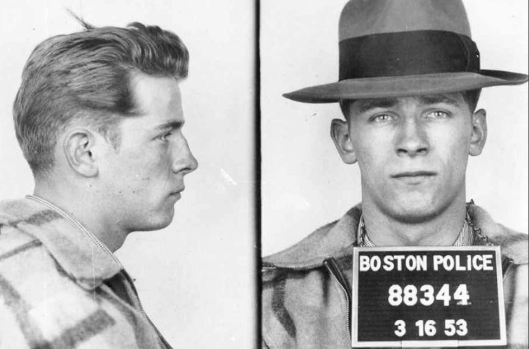It began as a deal with the devil — but in this case, the devil wore a tailored suit and ran South Boston like his personal fiefdom. His name was James “Whitey” Bulger, and he ruled through fear, blood, and charm. But what made his reign truly unholy wasn’t just the bodies buried in basements or the money laundered through shell companies. It was the fact that the most powerful law enforcement agency in America — the Federal Bureau of Investigation — not only knew what he was doing but helped him do it.
For decades, the FBI denied it all. They called the rumors conspiracy theories, the testimonies unreliable, the whistleblowers bitter. But in 1997, under court order, the façade cracked. The Bureau was forced to admit what had been whispered in Boston bars for years: Whitey Bulger had been an FBI informant since 1975, and his partner, Stephen “The Rifleman” Flemmi, even longer.
What followed was one of the darkest revelations in modern law enforcement history.
The Devil’s Bargain
In the mid-1970s, the FBI’s Boston office was obsessed with one mission — taking down the Italian Mafia. The North End mob, the Angiulo crime family, had a stranglehold on the city, and the Bureau wanted their heads. To do it, they needed insiders, informants who could provide intelligence on organized crime.
Whitey Bulger saw his opening.
He struck a deal: he’d feed the FBI information about his Italian rivals in exchange for protection. It was a trade that suited both sides perfectly — at least on paper. But what emerged was something far more insidious. Bulger wasn’t just an informant; he became untouchable.
By the late 1980s, Bulger’s Winter Hill Gang had effectively replaced the Italian mob as Boston’s dominant criminal force. Murders, extortion, drug trafficking — none of it seemed to touch him. Every time a local cop or DEA agent got close, the FBI tipped Bulger off.
Millions of taxpayer dollars were wasted on “investigations” that were secretly sabotaged from within. Listening devices planted in Bulger’s haunts mysteriously malfunctioned. Surveillance details leaked. Witnesses vanished. Murders went unsolved. The system wasn’t broken — it was rigged.
The Fix Was In
The truth finally surfaced in 1998, during an unprecedented federal court examination of the Bureau’s relationship with Bulger and Flemmi. Ten months of sworn testimony and stacks of secret FBI files painted a picture of breathtaking corruption.
Agents and informants exchanged envelopes of cash, gifts, and expensive dinners. The Bureau leaked classified information to protect Bulger. Evidence was hidden. Warrants were delayed or canceled. Rival investigators — local police, DEA, even other federal agents — were deliberately misled.
One FBI agent in particular, John Connolly, became Bulger’s personal guardian angel. Connolly grew up in South Boston, idolizing the older Bulger brothers. When he joined the Bureau, that admiration turned into something far more dangerous: loyalty. Connolly funneled sensitive information straight to Whitey, helping him eliminate rivals, stay one step ahead of law enforcement, and expand his empire.
It was a perfect illusion — a gangster pretending to be an informant, and a federal agent pretending to be a cop.
As Black Mass authors Dick Lehr and Gerard O’Neill wrote, the FBI-Bulger alliance was “deeper, dirtier, and more personal than anyone had imagined.”
A City Under Siege
While the Bureau toasted itself for “cleaning up” the Mafia, Boston’s streets ran red. Bulger’s Winter Hill Gang thrived under FBI protection, expanding into large-scale cocaine trafficking. Businesses paid “rent” to the mob to stay open. Ordinary people — truck drivers, bar owners, neighborhood shopkeepers — were extorted, threatened, or disappeared.
The FBI’s leaks didn’t just protect Bulger from arrest; they got people killed. Informants were exposed and murdered. Rival gangs were set up. Investigations into Bulger’s drug operations — which spread cocaine across Massachusetts and beyond — were derailed before they even began.
In one particularly outrageous instance, FBI agents warned Bulger about a DEA wiretap. Millions of dollars in government resources went up in smoke. The cocaine kept flowing.
And through it all, the Bureau stood by him — or rather, knelt.
As the court later revealed, many FBI agents in Boston acted with “an unmistakable arrogance — as if they owned the city.” And in a way, they did. Together, Bulger and the Bureau ruled Boston’s criminal and political underworld, one through fear and the other through institutional power.
Justice Delayed, Truth Denied
By the time the truth came to light in the late 1990s, Whitey Bulger was long gone. In 1995, after the FBI finally tipped him off about a pending indictment, he vanished. He would remain on the run for 16 years, living under false names across the country until his arrest in Santa Monica, California, in 2011.
When the story broke, the damage to the FBI’s reputation was catastrophic. Congressional hearings exposed the scale of the cover-up. Families of Bulger’s victims sued the government, and the Bureau was forced to pay millions in damages for what federal judges called “gross negligence and misconduct.”
But what those families wanted wasn’t money — it was accountability. And that never truly came. The FBI sacrificed a few agents, like Connolly, to preserve the institution. The deeper questions — about how such corruption could flourish for decades inside one of America’s most powerful agencies — were left largely unanswered.
Echoes in the Present
It would be comforting to believe that this was an isolated case, a bygone era of old Boston corruption. But history doesn’t stay buried. It metastasizes.
Today, whispers of protection, favoritism, and selective justice echo louder than ever. Certain names vanish from public records. Certain investigations stall. Certain powerful figures walk untouched while critics and opponents face relentless scrutiny. The methods have evolved, but the pattern is hauntingly familiar: a government agency, once trusted to uphold the law, wielding its power not for justice — but for loyalty, politics, and control.
The ghost of Whitey Bulger still walks the halls of American power. Not the man himself — but the idea that some people are too useful, too connected, too dangerous to ever be truly held accountable.
The Cost of Complicity
The FBI’s partnership with Bulger was more than corruption — it was moral collapse. It revealed how easily justice can be twisted when institutions trade integrity for influence.
When law enforcement shields criminals in exchange for “information,” the line between hunter and hunted disappears. When agents manipulate investigations to protect their favorites, the law becomes just another weapon for the powerful.
The Bulger saga reminds us that corruption rarely looks like chaos. It looks like order. It looks like polished reports, classified memos, polite denials — all while evil operates in plain sight.
The story of the FBI and Whitey Bulger is not ancient history. It is a mirror. And if we’re brave enough to look into it, we might see reflections we’d rather not recognize — of a system that still bends, quietly, to protect its chosen few.


